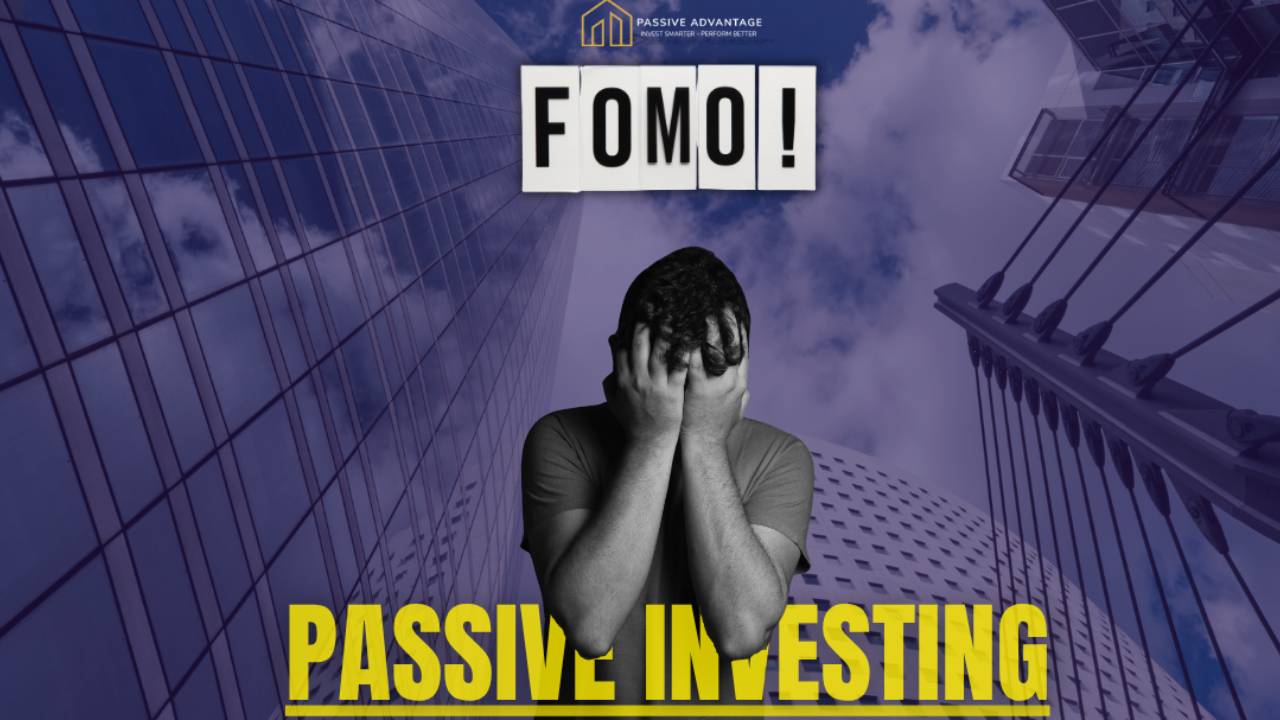Psychology of Passive Investing: FOMO, Patience, Long-Term

Table of Contents
Fear of missing out (FOMO), impatience, and short-term noise influence even seasoned investors. Understanding the psychological traps and emotional discipline needed for long-term wealth is just as crucial as mastering numbers or due diligence in real estate.
Let’s break down the three most impactful psychological elements of passive investing and how to manage them effectively.
1. FOMO: The Fear of Missing Out
FOMO is one of the most dangerous psychological forces in investing. You hear a friend say they doubled their returns on a multifamily deal, or a guru promotes a limited-time opportunity. Suddenly, the urge to act quickly overwhelms the need for thoughtful analysis.
How FOMO Shows Up:
- Rushing into deals without thorough due diligence in real estate.
- Ignoring your long-term goals to chase perceived opportunities.
- Trusting hype or headlines over fundamentals.
Managing FOMO:
- Create a written investment thesis. Know your target returns, time horizon, and risk tolerance.
- Stick to your criteria. If a deal doesn't meet your financial or strategic goals, walk away.
- Build a decision-making checklist. This keeps emotions out of the equation.
Pro Tip: Evaluate syndication opportunities using an investment rubric—not gut feeling. Tools like a Real Estate Deal Analyzer can help objectify your process.
2. Impatience and the Need for Instant Gratification
We live in a culture of immediate results—but multifamily real estate investment doesn’t work that way. Syndications typically last 3 to 7 years. Cash flow may be modest in early years, while most gains come at exit.
Common Behaviors:
- Constantly checking dashboards or sponsor updates.
- Comparing your syndication returns to fast-moving stock or crypto markets.
- Selling early due to anxiety or boredom.
Reframing Impatience:
- Remember: real estate wealth compounds slowly but reliably.
- Understand the real estate syndication phase: acquisition, stabilization, cash flow, disposition.
- Practice delayed gratification. Often, it’s the final payout that delivers exponential value.
Pro Tip: Use a timeline tracker or milestone map to visualize the process and reduce the urge to micromanage.
3. Long-Term Thinking: The Mindset Advantage
While the first two psychological traps hinder progress, long-term thinking is your competitive advantage. It promotes calm, patience, and consistency—the foundations of wealth-building.
Traits of Long-Term Investors:
- They diversify across syndications, asset classes, and time.
- They understand how tax benefits (e.g., depreciation) play out over years.
- They build a portfolio around recurring cash flow, not speculative wins.
How to Cultivate Long-Term Thinking:
- Read investor-focused real estate blogs and books on behavioral finance.
- Track returns quarterly or annually—not daily.
- Join mastermind groups or forums focused on passive investing.
Pro Tip: The most successful investors think in decades, not months.
Emotional Resilience in Real Estate Syndication
Markets fluctuate. Sponsors face challenges. Deals evolve. As a passive investor, your emotional resilience is key. Learning how to separate temporary noise from long-term fundamentals will protect your peace and your portfolio.
Strategies to Strengthen Resilience:
- Limit exposure to hype-driven financial media.
- Stay connected to your long-term "why".
- Focus on what you can control: your strategy, savings rate, and due diligence.
Due Diligence: More Than Numbers
Due diligence in real estate isn’t just reviewing financials. It’s assessing your emotional fit for the deal. Ask:
- Does this align with my risk tolerance?
- Am I comfortable with the investment timeline?
- Is this sponsor someone I trust through a full cycle?
Use structured due diligence templates to avoid decision fatigue and stay focused.
Building Your Passive Investing Playbook
Creating an emotional framework for your investing journey ensures that each decision supports your long-term vision. Here’s how to build your playbook:
1. Set Clear Investment Goals
- Income or appreciation?
- Time horizon: 5, 10, 20 years?
- Asset preference: core, value-add, development?
2. Define Your Emotional Boundaries
- What level of risk triggers anxiety?
- What time horizon am I truly comfortable with?
- What values must the sponsor or project align with?
3. Develop a Review Process
- Quarterly review of goals, performance, and portfolio balance
- Regular education via newsletters, podcasts, or webinars
Master Your Mind, Master Your Wealth
The journey of passive investing in multifamily real estate is as much about mindset as it is about market trends. If you can tame your FOMO, develop patience, and adopt long-term thinking, you’ll build not only a portfolio—but a legacy.
Don’t let fear or short-term noise steer your investment ship. The true reward lies in disciplined decisions, repeated over time. Learn the psychology, trust your process, and let your capital grow with confidence.
If you're looking to invest passively in real estate syndications and have been evaluating opportunities from sponsors, go ahead and try out our AI-powered LP Deal Analyzer tool. New registered users received two free deals!
Stay connected with news and updates!
Join our mailing list to receive the latest news and updates from our team.
Don't worry, your information will not be shared.
We hate SPAM. We will never sell your information, for any reason.



